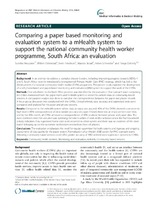| dc.contributor.author | Neupane, Sunisha | |
| dc.contributor.author | Odendaal, Willem | |
| dc.contributor.author | Friedman, Irwin | |
| dc.contributor.author | Jassat, Waasila | |
| dc.contributor.author | Schneider, Helen | |
| dc.contributor.author | Doherty, Tanya | |
| dc.date.accessioned | 2015-05-20T07:23:52Z | |
| dc.date.available | 2015-05-20T07:23:52Z | |
| dc.date.issued | 2014 | |
| dc.identifier.citation | Neupane, S. et al (2004). Comparing a paper based monitoring and evaluation system to a mHealth system to support the national community health worker Programme, South Africa: an evaluation.BMC Medical Informatics & Decision Making, 14 (69):1-9 | en_US |
| dc.identifier.issn | 1472-6947 | |
| dc.identifier.uri | http://hdl.handle.net/10566/1470 | |
| dc.description.abstract | BACKGROUND: In an attempt to address a complex disease burden, including improving progress towards MDGs 4 and 5, South Africa recently introduced a re-engineered Primary Health Care (PHC) strategy, which has led to the
development of a national community health worker (CHW) programme. The present study explored the development of a cell phone-based and paper-based monitoring and evaluation (M&E) system to support the work of the CHWs.
METHODS: One sub-district in the North West province was identified for the evaluation. One outreach team comprising ten CHWs maintained both the paper forms and mHealth system to record household data on community-based
services. A comparative analysis was done to calculate the correspondence between the paper and phone records. A focus group discussion was conducted with the CHWs. Clinical referrals, data accuracy and supervised visits were
compared and analysed for the paper and phone systems.
RESULTS: Compared to the mHealth system where data accuracy was assured, 40% of the CHWs showed a consistently high level (>90% correspondence) of data transfer accuracy on paper. Overall, there was an improvement over time,
and by the fifth month, all CHWs achieved a correspondence of 90% or above between phone and paper data. The most common error that occurred was summing the total number of visits and/or activities across the five household
activity indicators. Few supervised home visits were recorded in either system and there was no evidence of the team leader following up on the automatic notifications received on their cell phones. CONCLUSIONS: The evaluation emphasizes the need for regular supervision for both systems and rigorous and ongoing assessments of data quality for the paper system. Formalization of a mHealth M&E system for PHC outreach teams delivering community based services could offer greater accuracy of M&E and enhance supervision systems for CHWs. | en_US |
| dc.language.iso | en | en_US |
| dc.publisher | BioMed Central | en_US |
| dc.rights | This is an Open Access article distributed under the terms of the Creative
Commons Attribution License (http://creativecommons.org/licenses/by/4.0), which permits unrestricted use, distribution, and reproduction in any medium, provided the original work is properly credited. The Creative Commons Public Domain Dedication waiver (http://creativecommons.org/publicdomain/zero/1.0/) applies to the data made available in this article,unless otherwise stated. | |
| dc.source.uri | http://dx.doi.org/10.1186/1472-6947-14-69 | |
| dc.subject | Community health workers | en_US |
| dc.subject | Monitoring and evaluation | en_US |
| dc.subject | Mhealth | en_US |
| dc.subject | Community based services | en_US |
| dc.title | Comparing a paper based monitoring and evaluation system to a mHealth system to support the national community health worker programme, South Africa: an evaluation | en_US |
| dc.type | Article | en_US |
| dc.privacy.showsubmitter | false | |
| dc.status.ispeerreviewed | true | |
| dc.description.accreditation | Web of Science | en_US |

